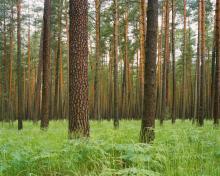 Asset Publisher
Asset Publisher
Silviculture
Crucial tasks of sulviculture are to sustain and enrich existing forests (forest renewal) and to create new forest areas (reforestation), observing natural conditions and natural process at the same time. Under the name of „Sulviculture" are the following: collection and storage of tree seeds and forest bush seeds, production of saplings in seedling nursery, creation, care and protection of forest cultivations.
Seed Centre of State Forests is the only source of gaining the highest quality seeds in Poland. Besides, it is also the only place, where we can obtain seeds of relevant origin. Poland possesses many well-known and valuable tree ecotypes in the whole Europe. Their seeds are highly esteemed because of their genetic value.
In Regional Directorate of State Forests in Zielona Góra, there are 16 seedling nurseries. Their area covers altogether about 108 hectares and produces almost 50 million of tree and bush saplings per year. These are classical nurseries, where saplings are produced with so called „ open-growth root system".
In the place called Rogoziniec in the area of Forest Division Babimost, there is a very modern container nursery, which makes saplings in boxes , in so called container system. Mentioned nursery produces about 1 million of such root cutting per year.
On average, each year, we plant over 30 million of different types of tree and bush saplings including 20 million of Scotch pine saplings for forest cultivations covering the area of 3 500 hectares.
Every year, we tend almost 10 thousand ha of cultures, removing weeds out of saplings and other crab grasses harmful to tree. In older cultivations and in young stands we make specialised cuts of nursing character. These cultivations called „Early Weeding" and „Late Weeding" cover about 9 thousand hectares altogether.
The last characteristic of sulviculture is deforestation of mature forest. It is conducted with further possibility of forest renewal, at the same time adapted to certain trees requirements.









